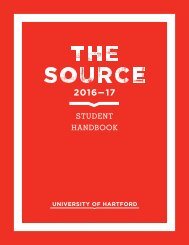advising
You also want an ePaper? Increase the reach of your titles
YUMPU automatically turns print PDFs into web optimized ePapers that Google loves.
COLLEGE OF ARTS AND SCIENCES<br />
Advising Information: 860.768.4257<br />
of traditional civilization in the world. This course fulfills a general<br />
education requirement.<br />
HIS 101 Civilization to 1650: Unfolding of Traditional<br />
Civilization [3]<br />
A study of the unfolding of traditional civilization: the emergence of<br />
civilization in the ancient Near East; the definition and development<br />
of traditional civilization in Eurasia and elsewhere to 1650, as<br />
Europe began history’s first modernization. This course fulfills a<br />
general education requirement.<br />
HIS 130 The United States to the Civil War Era [3]<br />
The first half of a two-part survey of American life since Columbus<br />
arrived in the New World, this course focuses on four principal<br />
topics: European colonization of the Americas, the development of<br />
the colonies and the road to the American Revolution, the origins<br />
and growth of African American slavery, and the coming of the Civil<br />
War. The course emphasizes broad themes and the experience of<br />
many different groups—farmers, servants, Indians, slaves,<br />
women—as well as the achievements of great leaders. Required for<br />
history majors. No prerequisite.<br />
HIS 131 The United States since the Civil War Era [3]<br />
The second half of a two-part survey of American life since<br />
Columbus arrived in the New World, this course focuses on<br />
five principal topics in American history since 1865: the rise<br />
of American industry and the development of American labor, world<br />
wars and America’s growing influence on world affairs, the impact<br />
of immigration, the birth and explosive growth of mass culture,<br />
the struggles to extend American democracy to excluded groups.<br />
The course emphasizes broad themes and the experiences of many<br />
different Americans as well as the achievements of great leaders.<br />
Required for history majors. No prerequisite.<br />
International Studies<br />
IS 100W Introduction to International Studies [3]<br />
An introductory survey of contemporary forces and issues in global<br />
affairs, laying the foundation for the major and minor in international<br />
studies. Topics include conflict, governance, economic flows and<br />
development, the global commons, and information and culture.<br />
Required for IS majors.<br />
Judaic Studies<br />
ARA 110 Elementary Arabic I [3]<br />
This course introduces Modern Standard Arabic (MSA) language and<br />
cultures of the Arabic-speaking world. Course includes the five basic<br />
skills of listening, speaking, reading, writing, and cultural knowledge.<br />
ARA 111 Elementary Arabic II [3]<br />
This course continues the study of Modern Standard Arabic (MSA)<br />
language and cultures of the Arabic-speaking world. Course includes<br />
the five basic skills of listening, speaking, reading, writing, and<br />
cultural knowledge.<br />
HBR 113-114 Hebrew Language I and II: Elementary<br />
Conversational Hebrew [3-3]<br />
Development of basic language skills, reading, writing, and speaking.<br />
The course also covers cultural material of Israel and Jewish<br />
civilization.<br />
JS 228/HIS 228/REL 228 American-Jewish History [3]<br />
The experience of American Jews from the colonial period to the<br />
present, with the examination of their social, political, religious, and<br />
economic development. Episodes in the Jewish experience include<br />
the colonial period, the early republic, the Civil War, the eras of<br />
German and East European Jewish immigration to the United<br />
States, the Holocaust years, and the post–World War II era.<br />
Mathematics<br />
M 110 Modeling with Elementary Functions [3]<br />
A study of linear, quadratic, cubic, exponential, and logistic equations<br />
and their use in modeling real-world phenomena; the graphing of<br />
functions; solving equations with one or more variables; and systems<br />
of linear equations. The solution of word problems is stressed<br />
throughout. This course may serve as preparation for M 112 but not<br />
for M 144. Prerequisite: Two years of algebra.<br />
M 112 A Short Course in Calculus [3]<br />
A one-semester introduction to the basic concepts and applications<br />
of differential and integral calculus. No credit given to students who<br />
have previously received credit for M 144 or its equivalent.<br />
M 114 Everyday Statistics [3]<br />
Designed to introduce basic concepts of probability, random<br />
sampling, data organization, measures of central tendency and<br />
variability, binomial and normal probability distributions, statistical<br />
inference, elements of hypothesis testing, one- and two-sample tests<br />
for means and proportions, chi-square tests for tabular data; an<br />
introduction to linear regression and correlation. Prerequisite: Two<br />
years of algebra.<br />
M 116 Contemporary Mathematics [3]<br />
Designed to introduce the student to a variety of mathematical<br />
fields and some of their contemporary applications. Topics selected<br />
from logic, set theory, mathematical systems, recursive sequences,<br />
probability, statistics, game theory, linear programming, graph<br />
theory, computer programming, voting methods, and topology.<br />
Prerequisite: Two years of algebra.<br />
M 140 Precalculus with Trigonometry [4]<br />
A study of linear and quadratic equations and inequalities; the<br />
Cartesian coordinate system for the plane; and the algebra and<br />
graphing of functions, with special emphasis on polynomial,<br />
exponential, and logarithmic functions. Definitions and graphs of the<br />
trigonometric functions; solutions of triangles; analytic trigonometry,<br />
including circular and inverse trigonometric functions. Solutions of<br />
word problems are stressed throughout. A programmable graphing<br />
calculator is required. The goal is to prepare students for M 144.<br />
Prerequisite: Two years of algebra.<br />
21



